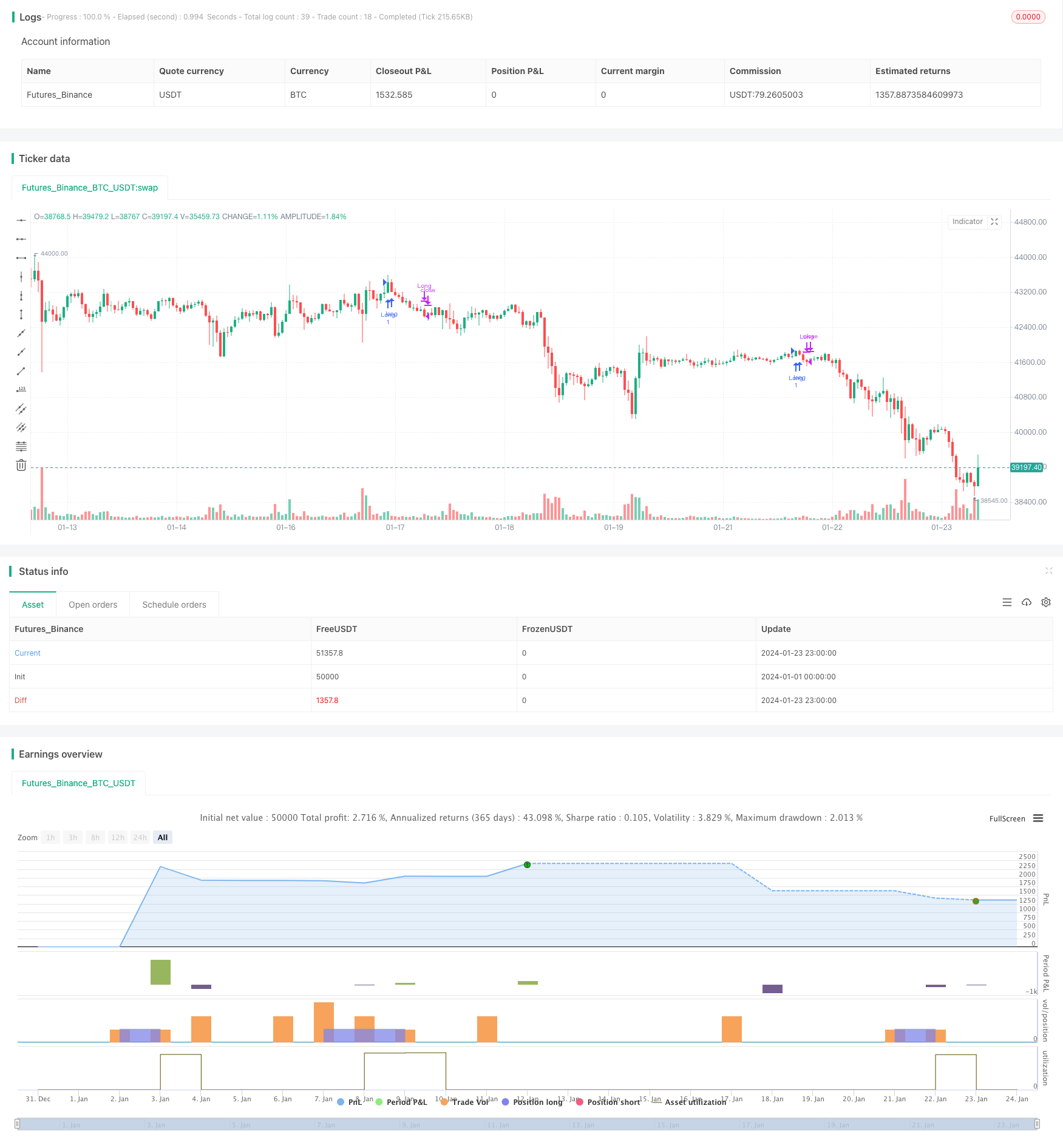
概述
该策略首先结合量价指标VFI和移动平均线构建趋势判断,再结合布林带指标判断反转事件,实现了趋势交易与震荡交易的有机结合。
策略原理
该策略主要由以下几部分组成:
VFI指标判断趋势。结合典型价格的对数变化率和交易量变化判断价格趋势,实现量价合理匹配。
EMA差值指标判断趋势。计算20日线与50日线的差值比例,判断中长线趋势方向。
布林带指标判断反转。布林带中轨为20日简单移动平均线,带宽为中轨1.5倍标准差。价格突破上下轨时发出交易信号。
VFI指标幅度判断反转。VFI值接近上下限(0、20)时认为趋势反转的可能性较大。
在满足交易时间段的条件下,当价格突破布林带上轨,且VFI、EMA差值指标同向看涨时,做多;当价格跌破布林带下轨,或VFI达到某一阈值时,平仓。
策略优势
VFI指标的引入,使量价关系匹配更加合理,避免盲目跟随价格。
EMA差值的判断和VFI结合,使趋势判断更为稳定可靠。
布林带与VFI指标的反转判断相结合,使策略更适合市场的双向波动。
策略风险
量价指标并不能完全避免假突破的风险。
EMA差值存在一定滞后,无法对短期转折作出及时反应。
布林带参数设置不当可能导致交易频繁或captured market的风险。
对应风险的解决方法:
结合更多指标判断趋势,避免单一指标依赖。
EMA参数不宜过大或过小,适当调整参数。
测试不同市场情况下布林带参数变化对策略的影响。
策略优化方向
继续优化VFI参数,使其更灵敏。
增加基于价格通道或Envelopes指标的突破判断。
测试更多量价指标的引入,如OBV、PVT等。
引入机器学习和AI技术,实现参数的动态优化。
总结
该策略综合考虑了趋势判断与反转判断,运用VFI、EMA差值与布林带指标,实现了对市场双向波动的捕捉。下一步将继续优化参数设置,丰富判断依据,扩大适用范围,提高策略稳定盈利能力。
策略源码
/*backtest
start: 2024-01-01 00:00:00
end: 2024-01-24 00:00:00
period: 1h
basePeriod: 15m
exchanges: [{"eid":"Futures_Binance","currency":"BTC_USDT"}]
*/
// This source code is subject to the terms of the Mozilla Public License 2.0 at https://mozilla.org/MPL/2.0/
// © beststockalert
//@version=4
strategy(title="Super Bollinger Band Breakout", shorttitle = "Super BB-BO", overlay=true)
source = close
length = input(130, title="VFI length")
coef = input(0.2)
vcoef = input(2.5, title="Max. vol. cutoff")
signalLength=input(5)
// session
pre = input( type=input.session, defval="0400-0935")
trade_session = input( type=input.session, defval="0945-1700")
use_trade_session = true
isinsession = use_trade_session ? not na(time('1', trade_session)) : true
is_newbar(sess) =>
t = time("D", sess)
not na(t) and (na(t[1]) or t > t[1])
is_session(sess) =>
not na(time(timeframe.period, sess))
preNew = is_newbar(pre)
preSession = is_session(pre)
float preLow = na
preLow := preSession ? preNew ? low : min(preLow[1], low) : preLow[1]
float preHigh = na
preHigh := preSession ? preNew ? high : max(preHigh[1], high) : preHigh[1]
// vfi 9lazybear
ma(x,y) => 0 ? sma(x,y) : x
typical=hlc3
inter = log( typical ) - log( typical[1] )
vinter = stdev(inter, 30 )
cutoff = coef * vinter * close
vave = sma( volume, length )[1]
vmax = vave * vcoef
vc = iff(volume < vmax, volume, vmax) //min( volume, vmax )
mf = typical - typical[1]
vcp = iff( mf > cutoff, vc, iff ( mf < -cutoff, -vc, 0 ) )
vfi = ma(sum( vcp , length )/vave, 3)
vfima=ema( vfi, signalLength )
//ema diff
ema20 = ema(close,20)
ema50 = ema(close,50)
diff = (ema20-ema50)*100/ema20
ediff = ema(diff,20)
//
basis = sma(source, 20)
dev = 1.5 * stdev(source, 20)
upper = basis + dev
lower = basis - dev
ema9 = ema(source, 9)
if ( ((crossover(source, upper) and diff>ediff and diff>0) or (close>upper and (vfi >0 or vfima>0 or ediff>0.05) and (vfi<14 or vfima<14)) ))
strategy.entry("Long", strategy.long)
if (crossunder(source, lower) or vfi>19 or vfima>19 or diff<(ediff+0.01) )
strategy.close("Long")